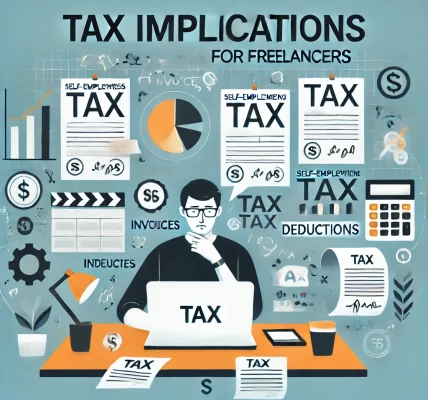Introduction
As the financial year draws to a close, taxpayers often scramble to find ways to minimize their tax liability. Whether you are a salaried employee, self-employed professional, or business owner, utilizing last-minute tax-saving strategies can help you save significantly. The Income Tax Act of India provides multiple avenues for deductions and exemptions that can be leveraged even at the last moment.
This DIY guide will walk you through smart, legal, and effective tax-saving hacks to ensure you make the most of your deductions before the financial year ends.
1. Maximize Deductions Under Section 80C
Section 80C allows deductions up to INR 1.5 lakh per year on eligible investments and expenses. If you haven’t fully utilized this limit, consider these last-minute options:
a) Invest in Tax-Saving Instruments
- Public Provident Fund (PPF) – Secure, long-term investment with tax-free returns.
- Equity-Linked Savings Scheme (ELSS) – Offers higher returns and the shortest lock-in period (3 years).
- National Savings Certificate (NSC) – Fixed returns and a 5-year lock-in.
- Fixed Deposits (FD) (5-year lock-in) – Tax-saving FDs with assured returns.
- Sukanya Samriddhi Yojana (SSY) – Ideal for those with a girl child.
b) Pay Pending Premiums
- Life Insurance premium payments (Term plans, Endowment policies, ULIPs) qualify under 80C.
- Tuition fees for up to two children are eligible for tax deduction.
c) Prepay Your Home Loan Principal
If you have a home loan, prepay the principal amount to claim deductions under Section 80C.
2. Utilize Section 80D for Health Insurance Benefits
Health insurance is not just essential for financial security but also provides tax benefits:
- Self, Spouse & Children: Up to INR 25,000 deduction.
- Parents (below 60 years): Additional INR 25,000.
- Senior Citizen Parents: Deduction limit increases to INR 50,000.
- Preventive Health Checkups: You can claim INR 5,000 as a part of 80D deduction.
If you haven’t renewed your health insurance yet, do it before March 31st to claim the deduction this year.
3. Claim Deductions on Home Loan Interest (Section 24B & 80EEA)
- Under Section 24B, you can claim up to INR 2 lakh deduction on home loan interest.
- First-time homebuyers can claim an additional INR 1.5 lakh under Section 80EEA.
- Pay any pending EMI dues before March 31st to ensure deduction benefits for this financial year.
4. Invest in National Pension System (NPS) – Section 80CCD(1B)
- Additional deduction of INR 50,000 over and above 80C.
- Employer contributions (up to 10% of salary) are also deductible.
- Make an extra voluntary NPS contribution before March 31st to claim this deduction.
5. Save Tax on Rent Paid (Section 10(13A) & 80GG)
- For Salaried Employees with HRA: Deduction based on rent paid, salary, and HRA received.
- For Self-Employed or Salaried Without HRA: Section 80GG allows deduction up to INR 60,000 per year.
- Pay pending rent for the current year before March 31st to claim deductions.
6. Claim Tax Benefits on Education Loan Interest – Section 80E
- No upper limit on the deduction.
- Only interest paid on an education loan is deductible.
- If you have an education loan, ensure your EMIs are paid before March 31st.
7. Donate to Charity – Section 80G
- Donations to eligible NGOs, relief funds, and institutions qualify for tax deductions.
- Some donations qualify for 100% deduction, while others qualify for 50% deduction.
- Ensure you make donations through banking channels and collect a valid receipt before the year ends.
8. Optimize Business & Professional Tax Savings
If you are self-employed or own a business, consider these:
- Advance Tax Payment: Ensure you have paid all four installments to avoid penalties.
- Depreciation Benefits: Claim depreciation on business assets.
- Expense Payments: Pay outstanding business expenses like rent, salaries, and vendor payments before March 31st to claim deductions.
9. Utilize LTA (Leave Travel Allowance) and Other Exemptions
- If your employer provides LTA, ensure you make the required travel claim before the year ends.
- If you haven’t used allowances such as food coupons or phone reimbursements, check with your employer to claim them.
10. File Your ITR in Advance & Reconcile Taxes
- Check Form 26AS & AIS: Ensure your tax credits are correctly reflected.
- Claim Refunds Promptly: If excess TDS has been deducted, file your ITR early to get a refund faster.
- Avoid Last-Minute Errors: Filing early reduces the risk of errors or missed deductions.
Frequently Asked Questions (FAQs)
Q1: Can I invest in multiple 80C instruments to maximize deductions?
Yes, you can invest in a mix of PPF, ELSS, NSC, and others, but the total deduction is capped at INR 1.5 lakh.
Q2: Can I claim both HRA and home loan deductions?
Yes, if you live in a rented house but have a home loan, you can claim both HRA and home loan interest deductions.
Q3: Can I claim deductions if I switch jobs during the year?
Yes, deductions are based on total income, so they remain valid even if you switch jobs.
Q4: Can I carry forward unused deductions to next year?
No, tax deductions must be claimed within the same financial year; unused deductions do not carry forward.
Q5: Is filing an income tax return necessary even if I don’t have taxable income?
Yes, it is recommended to file ITR even if your taxable income is below the limit, as it helps in loan approvals and financial credibility.
Conclusion
Taking advantage of these last-minute tax-saving hacks can help you legally reduce your tax burden before the financial year ends. By making strategic investments, paying off eligible expenses, and utilizing exemptions wisely, you can maximize your tax savings while ensuring compliance with tax laws.




